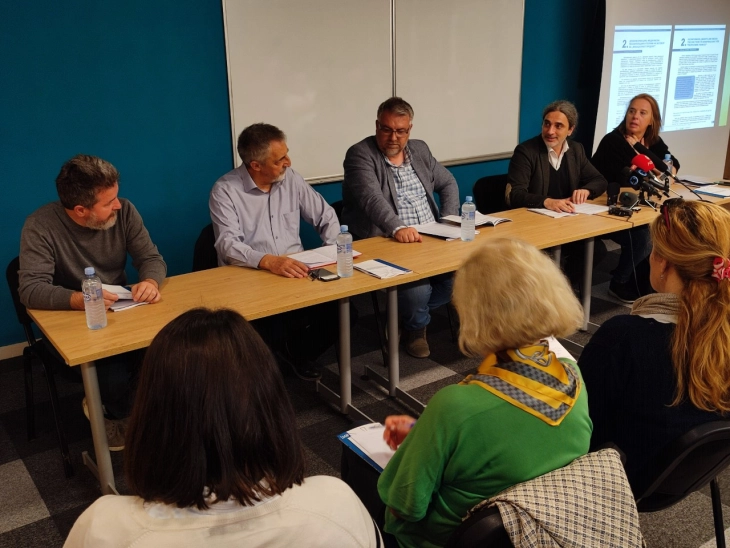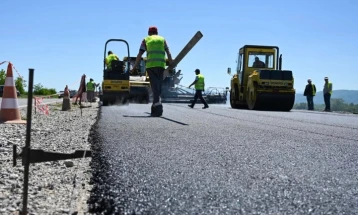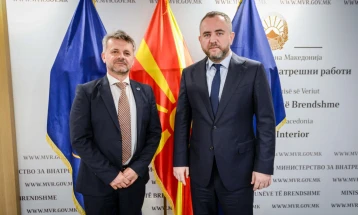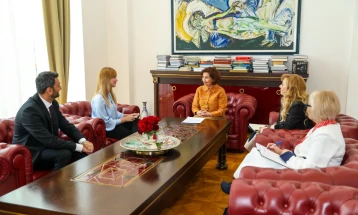'French Proposal’ media analysts: Hate speech harmful to good-neighborly relations

Skopje, 30 September 2022 (MIA) – Hate speech feeds on hate speech; North Macedonia's and Bulgaria's institutions, media and civil sector need to cooperate in dealing with hate speech and misinformation to maintain good-neighborly relations, according to the Institute for Media and Analytics in its publication “The French Proposal: Hate Speech, Misinformation, Media Manipulation (Media Analysis)” released Friday.
“During the debate on the French proposal, we had an eruption of hate speech, and the symbolism of the volcano is that in our country there is a regular active volcano when it comes to hate speech," Zoran Bojarovski from the Institute for Media Analysis said.
Bojarovski, who is the author of one of the published analyses, also said "this volcano, the hate speech, always erupts and results in very strong explosions as soon as there are discussions on topics which instead of uniting and homogenizing society around the ultimate interests of our country and its people, cause polarization and further divisions in society.”
He said hate speech had spread from social media to the institutions, which put the country on the verge of serious riots.
“Hate speech from social media, where it is dominant and constantly active, moved, with great intensity, to the institutions, during the discussion in Parliament where we witnessed extremely harsh hate speech. It is a bureaucratic procedure which was greatly influenced by the fact that Bulgaria came out with certain positions, which we are all familiar with, but the issue was the question whether we accept the beginning of EU negotiations, and not the discussion of the alleged fatal future of the Macedonian people. From there, the hate speech present in the institutions, mainly in Parliament within opposition MPs, managed to move to the streets, where we had a situation in which we were on the verge of serious riots. This is just one aspect of the irresponsible approach to these issues, which is obviously a regular occurrence and is abused in situations like these,” said Bojarovski.
According to him, the discussion of the French proposal was used to attack certain ethnic communities, social groups, civil society organizations and activists, which is collateral damage and seriously affects the concept of one society for all, which should be protected as much as possible.
Regarding the reporting of the Albanian-language media during the public discussion of the French proposal, Prof. Sefer Tahiri said that the conclusion of the textual analysis of headlines is that the Albanian-language media chose affirmative evaluations of the proposal because they were dominated by the narrative that the proposal is a compromise, even that there are no alternatives to the proposal. On the other hand, taking into account the sensitivity of the French proposal, there were moderate reports on the line of threatening the ethno-cultural identity of the Macedonian people.
Regarding the protests against the French proposal, he pointed out that certain Albanian-language media noted the anti-Albanian positions, i.e, the presence of stereotypes and prejudices towards Albanians. The same happened with the July 6 incident between the protesters against the French proposal and a group of Albanians (when a gun was fired). Tahiri said that not a single Albanian-language media had mentioned that the event included an act which could be interpreted as illegal, nor condemned the use of a weapon, placing the emphasis on ethnocentric narratives.
“The media should be careful when reporting sensitive statements, specifically those of sensationalist nature. Not only do they bend the facts but can result in the worsening of the already fragile interethnic relations,” said Tahiri.
Petrit Sarachini from the IMA pointed to the reactions of certain professional organizations according to which hate speech in relation to the French proposal, the protocol and the negotiating framework should be treated within the framework of the internationally accepted definitions, documents, conventions and mechanisms which the country is obliged to respect.
“The prevailing opinion is that the competent organizations are not doing enough, creating a culture of impunity. Additionally, media organizations and experts are noting that the institutions and the government in North Macedonia were not sufficiently transparent during the entire process of defining the EU negotiating framework and the protocol with Bulgaria. Initially there were unofficial announcements and papers in the media, followed by a few days of silence before the institutions finally published the papers. This left a space for a lot of speculation, misinformation and hate speech to emerge in the public,” said Sarachini, noting that the institutions should be as fast as possible and more transparent, because, he said, the truth can prevent misinformation.
Even though both countries are obliged to fight against hate speech, as a result of propaganda and misinformation, an impression was created in the public that this is only our obligation, which, he said, is a failure of the institutions, the media and the academic community, which are the ones responsible for explaining the facts, in order to prevent the citizens from being manipulated.
According to him, the dilemmas of the media and the expert community regarding hate speech will be answered once the action plans discussed in the negotiating documents are finalized, because they contain general definitions and there is talk about certain mechanisms. However, he said, these mechanisms were yet to be established, the bodies were not functional and they had not even been formed yet.
The publication contains analyses identifying the characteristics and elements of hate speech, misinformation and media manipulation prevalent in the discourse during the debate on the French proposal, and how they are reflected in the current discourse in the country in the context of the proposed framework for the opening of the EU accession negotiations. As part of the event the attendees were also addressed by the other authors of the analyses and texts in the publication: Katerina Kolozova and Zharko Trajanoski. ad/mr







